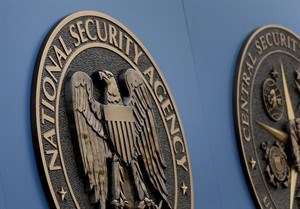
FILE - This Thursday, June 6, 2013, file photo, shows a sign outside the National Security Administration (NSA) campus in Fort Meade, Md. The National Security Agency has implanted software in nearly 100,000 computers around the world — but not in the United States — that allows the U.S. to conduct surveillance on those machines, The New York Times reported Tuesday, Jan. 14, 2014. ((AP Photo/Patrick Semansky, File)
January 15, 2014 - 9:50 PM
WASHINGTON - President Barack Obama's blueprint for overhauling the government's sweeping surveillance program is just the starting point. The reality is few changes could happen quickly without unlikely agreements from a divided Congress and federal judges.
The most contentious debate probably will be over the future of the National Security Agency's bulk collection of telephone records from millions of Americans. In his highly anticipated speech on Friday, Obama is expected to back the idea of changing the program. But h will leave the specifics to Congress, according to U.S. officials briefed on the White House review.
That puts key decisions in the hands of lawmakers who are at odds over everything from whether the collections should continue to who should house the data.
Even a widely supported proposal to put an independent privacy advocate in the secretive court that approves spying on Americans is coming under intense scrutiny. Obama has indicated he will back the proposal, which was one of 46 recommendations he received from a White House-appointed commission. But a senior U.S. district judge declared this week that the advocate role was unnecessary, and other opponents have constitutional concerns about whether the advocate would have standing to appear in court.
The uncertain road ahead raises questions about the practical impact of the surveillance decisions Obama will announce in his speech at the Justice Department. The intelligence community is pressing for the core of the spy programs to be left largely intact, while privacy advocates fear the president's changes may be largely cosmetic.
Stephen Vladeck, a national security law expert at American University, said the key questions will be "how much of this reform conversation is going to be about curtailing the specific surveillance programs and how much of it is going to be instead about improving the checks and balances on the programs that already exist."
Obama's speech marks the end of a months-long White House review spurred by former NSA analyst Edward Snowden's revelations about the secret government surveillance programs both at home and abroad. The disclosures restarted a dormant debate over surveillance — on Capitol Hill and among outraged allies overseas.
For Obama, changing the overseas spying program may well be easier than implementing domestic reforms. On its own, the administration can enact two international surveillance changes officials say the president supports: extending some privacy protections to foreign citizens and tightening the protocols for decisions on spying on foreign leaders. Still, it's unclear whether those steps will be enough to soothe international anger.
___
Associated Press writer Tracy Brown contributed to this report.
___
Follow Julie Pace at http://twitter.com/jpaceDC
News from © The Associated Press, 2014